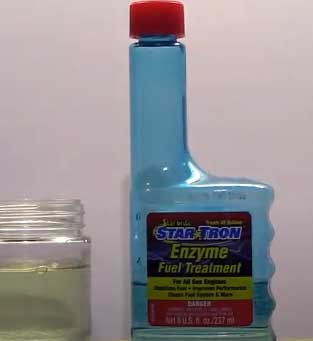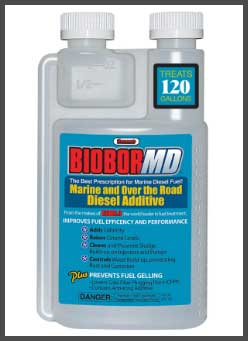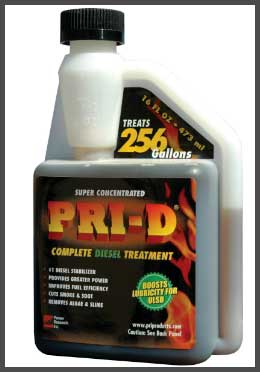If you’re navigating the rough waters of choosing the best marine diesel fuel additive for your vessel, fear not! We’re here to help.
Understanding Marine Diesel Fuel Additives
Before diving into specific reviews, let’s grasp what a marine diesel fuel additive is and what it brings to the table. Fuel additives are complex chemical compounds designed to improve the efficiency and performance of marine diesel engines. They work by reducing common problems like sludge accumulation, microbial growth, and fuel degradation.
Now, onto the main event—let’s navigate the turbulent seas of marine diesel fuel additive reviews.
Star Brite Star Tron Enzyme Fuel Treatment

This additive is known to be a strong performer, making it a popular choice among mariners.
The Star Tron Enzyme treatment works wonders by breaking down excess water and sludge, turning them into sub-micron-sized particles.
This allows your engine to burn off these otherwise harmful elements more efficiently.
Pros:
- Effectively combats ethanol-based problems
- Decreases all emissions
- Increases fuel economy
Cons:
- Not as efficient with older engines
- May require frequent treatments
Biobor JF Microbiocide
If you’re battling microbial growth in your diesel fuel system, Biobor JF Microbiocide might be your knight in shining armor. This additive stands tall in eliminating bacteria and fungi, which can cause sludge, block filters, and lead to fuel degradation.
Pros:
- Powerful against bacteria and fungi
- Reduces the need for tank cleaning
- Approved by major diesel engine manufacturers
Cons:
- May not offer improved fuel efficiency
- Higher price point
Hammonds Biobor MD Marine Diesel Additive

Hammonds Biobor MD specifically caters to the needs of marine diesel engines.
It helps optimize fuel burn and maintain peak engine performance by eliminating soot, carbon deposits, and other contaminants.
Pros:
- Enhances power and fuel economy
- Reduces smoke and soot output
- Effective for long-term storage
Cons:
- Not effective against microbial growth
- May not be suitable for all diesel types
Lucas Oil 10013 Fuel Treatment
Lucas Oil is a well-recognized name in the engine treatment space. Their 10013 Fuel Treatment is no exception, boasting a robust formulation that increases power and fuel mileage while decreasing exhaust emissions.
Pros:
- Improves fuel efficiency
- Helps to neutralize low-sulfur fuel problems
- Decreases emissions
Cons:
- Not specifically formulated for marine diesel engines
- Results may vary across engine types
Power Service 03080-06 +Cetane Boost Diesel Kleen Fuel Additive
Power Service +Cetane Boost is a multi-functional diesel fuel additive. It’s designed to boost cetane, clean the fuel system, and increase fuel economy.
Pros:
- Boosts power and performance
- Promotes cleaner injectors
- Enhances fuel stability
Cons:
- Not specifically designed for marine use
- Not the best for combating microbial growth
PRI-D Diesel Fuel Treatment

PRI-D Diesel Fuel Treatment is an industry favorite for fuel stabilization.
It’s great for storing diesel fuel, as it prevents fuel degradation and maintains peak engine performance.
Pros:
- Excellent for long-term storage
- Enhances fuel combustion and power
- Reduces smoke and soot emissions
Cons:
- Less effective against sludge buildup
- Not designed to combat microbial contamination
Stanadyne Performance Formula One Shot
Stanadyne is a renowned brand, and their Performance Formula One Shot stands out for its all-season performance. This additive increases power, improves fuel economy, and reduces wear.
Pros:
- Improves engine performance and longevity
- Reduces fuel consumption
- Effective in all seasons
Cons:
- Slightly higher cost than competitors
- May not combat microbial growth effectively
Key Features of A Good Marine Diesel Fuel Additive
Marine diesel fuel additives are a vital component in maintaining the health and longevity of your marine diesel engine. However, not all additives are created equal.
Let’s dive in and explore the key features that make a marine diesel fuel additive stand out from the crowd.
- Cleaning Capabilities
One of the primary roles of a fuel additive is to keep your engine clean. High-quality fuel additives are capable of dissolving and dispersing dirt and deposits that form in your fuel system, especially around injectors and in combustion chambers.
They can tackle stubborn substances like carbon, varnish, and gum deposits that often lead to loss of power and decreased fuel efficiency.
- Fuel Stabilization
Over time, diesel fuel can degrade, especially during periods of non-use. This degradation can cause problems like gum formation and sediment accumulation.
Top-notch diesel fuel additives contain stabilizers that help preserve the fuel’s integrity, extending its lifespan, and preventing these issues.
- Cetane Boost
The cetane number of diesel fuel is a measure of its ignition quality – higher cetane numbers mean the fuel ignites more quickly when injected into the engine.
Some diesel fuel additives provide a cetane boost, improving engine performance, reducing emissions, and providing smoother, quieter operation.
- Water Dispersal
Water contamination is a common issue in diesel fuel, often leading to microbial growth and potential engine damage. Quality marine diesel fuel additives contain demulsifiers that help separate water from the fuel.
This water can then be removed before it becomes a problem.
- Anti-Corrosion and Anti-Wear Properties
Fuel additives can also play a significant role in protecting the engine and fuel system components from corrosion and wear.
Anti-corrosion additives help protect metal surfaces from rust and corrosion, while anti-wear additives form a protective layer on engine components, reducing wear and tear.
- Biocide
Finally, some marine diesel fuel additives contain biocides, which are essential in killing and preventing the growth of harmful microbes (bacteria and fungi) that can form in the presence of water, leading to the formation of sludge and acids in the fuel.
When selecting a marine diesel fuel additive, look for one that covers most, if not all, of these key features. Remember, the health and longevity of your marine diesel engine can significantly depend on the quality of the fuel additive you use.
Also Read: Comparison of HotShot’s And Archoil Diesel Additives.
Frequently Asked Questions (FAQ)
Absolutely! Diesel fuel additives are scientifically designed to address various challenges in marine diesel engines. From cleaning the engine to enhancing fuel economy and combating microbial growth—there’s an additive for most issues. However, results can vary based on the type and quality of the additive and the specific needs of your engine.
For common rail diesel engines, we recommend the Lucas Oil 10013 Fuel Treatment. It’s designed to increase power and fuel mileage while also decreasing exhaust emissions—an ideal choice for this type of engine.
The Star Brite Star Tron Enzyme Fuel Treatment is one of the best additives for tackling sludge. Its unique enzyme formula breaks down sludge into burnable particles, helping to clear your fuel system.
With the right additive, diesel fuel can last up to two years without significant degradation, which is considerably longer than untreated fuel. The exact lifespan can vary based on factors like storage conditions and the specific additive used.
Wrapping Up
In the end, the optimal marine diesel fuel additive for you will depend on your engine’s specific needs and the particular challenges you’re facing. Remember, it’s all smooth sailing once you find the perfect match.
Happy voyaging!


